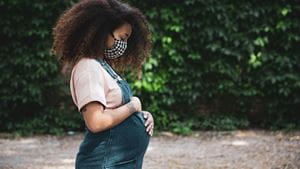
During the course of a woman’s pregnancy, it is normal for questions to arise about how a woman and her growing baby can stay healthy – both during her pregnancy and after giving birth. Over the last few years, COVID-19 and its effects has added to that list of questions.
At Rochester Regional Health, our many well-experienced OBGYN providers work to empower women with the knowledge they need to stay healthy through all stages of life. One of our OBGYN providers – Elizabeth Bostock, MD – offers her insight into a new meta-analysis published in the journal BMJ Global Health that suggests pregnant women and their fetuses who are infected with COVID-19 face increased risk for severe illness and death.
Researchers screened 137 studies involving pregnant women and COVID-19. Of those studies, the research team focused intensely on 12 studies in 12 different countries.
In total, data from 13,136 pregnant women was reviewed by researchers. Roughly 2,000 of those women had COVID-19; the other 11,000 had a negative COVID-19 test result.
When the studies were reviewed, researchers found pregnant women with COVID-19 were roughly four times more likely to be admitted to an intensive care unit when compared to pregnant women who tested negative for COVID-19. Pregnant women with COVID-19 were also seven times more likely to die.
Babies who were born to mothers with COVID-19 were more likely to be born pre-term, be admitted to a neonatal care unit, and have a low birth rate compared to babies born to mothers who were not infected with COVID-19.
The meta-analysis pointed out that, compared to pregnant women without a COVID infection, babies were not any more likely to be stillborn or have their growth in the womb limited by their mother having a COVID infection.
As more scientists study COVID-19 and its effects on people, research continues to show the best way to protect a pregnant woman and baby against COVID-19 is to receive a COVID-19 vaccination.
Current research shows COVID-19 vaccines offer no increased risk to pregnant women or their babies compared to unvaccinated pregnant women and their babies. Research also shows women who get a COVID-19 vaccine dose while pregnant pass along antibodies to their fetus.
As of mid-January, nearly three-quarters of all people living in the U.S. over the age of 5 have received their primary COVID-19 vaccine series. Nearly 16 percent of those same people have gotten an updated COVID booster dose.
Wearing a mask in public settings, washing hands for at least 20 seconds with soap and water, and staying home when sick can all help prevent people from getting sick in general – and prevent the spread of COVID-19.
“Pregnancy and childbirth are beautiful and transformative time for mother, baby and family,” said Elizabeth Bostock, MD, an OBGYN with Rochester Regional Health. “Vaccination and masking supports having a healthy pregnancy as well as promoting the health of the next generation.”